[substack archives] puresound letter 002: remembering everyone
![[substack archives] puresound letter 002: remembering everyone](/content/images/size/w960/2021/05/puresound-002.png)
Originally published on Substack by Alex Brown on September 20, 2019
"In 1984 I was hospitalized for approaching perfection"

image description: an outstretched hand holding a bright carton of fresh blueberries. i have drawn cartoon yellow “light” lines surrounding the berry carton. overlaid text: “puresound letter 002” “remembering everyone”
image credit: againstcotton
Was August also kind of a weird month for you? July faded out as quickly as it came and left us all heat-wave-addled and exhausted. August was a long stretch of dusty pavement and the last of the berry harvest, summer jobs and tying up loose ends. I get in my head a lot during August because there’s my diagnosaversary (seven years bitch!!!) and my birthday (22 years bitch!!!!!!) and several birthdays of people who we have loved and lost. And there’s usually back-to-school as well, but I recently graduated college so I’m in this period where I just work at a restaurant five days a week and keep my dark purple diploma on my dresser so I can look at it and remember that I never have to worry about failing Music Theory II again or spending two hundred dollars on a digital access code for a Spanish textbook. My girlfriend is still in college which is great because I can go over to her apartment and experience all the great things about (liberal arts, women’s) college like drinking sangria out of a mason jar and watching Spiderman: Into The Spiderverse while slowly sinking into someone’s deflating air mattress and bruising my ribs on the linoleum without having to write a 16-page paper the next day.
Anyway.
This issue of the newsletter is about remembering things and people. I’ve been hung up on the phrase “remembering everyone” ever since the Mountain Goats used it in their In League With Dragons album earlier this year, and because I took a class entirely focused on memoir and my phenomenal professor had us all deep-dive into the act of memory and remembering and truthiness and reliving stuff. In their respective memoirs, both Keah Brown and Nina G. remember a lot of people who have helped them and hurt them, because I guess memoir is as much about remembering other people as it is about remembering yourself.
I also called it remembering everyone because I feel like we’re losing a lot of people. In a devastating turn of events, we lost Nobel Prize winner and gift to the earth Toni Morrison. It’s hard to know what quite to say about someone whose work had so much effect on the literary world and the minds of so many readers. I recommend the Toni Morrison episode of The Cut on Tuesdays, as a tribute.
We also lost poet/songwriter David Berman of the Silver Jews. I read Kaddish for David Berman in Jewish Currents which I think helped me understand his life and his work more, but it damn well didn’t make it any easier to listen to his most recent music, which was released shortly before his death by suicide, and, well, his headspace is pretty apparent in it. We lost Daniel Johnston, too; whose music I know helped a lot of people, and losing people whose work meant a lot to you always feels deeply strange, and so if you’re remembering someone who’s gone I’m thinking about you.
If my writing feels like it’s missing some punctuation it’s probably because I’ve been reading Luke O’Neil’s newsletter Welcome to Hell World. It’s for you if you don’t mind facing the difficult stuff head-on and also feel like you’re completely losing your mind every time you read news that strives for objectivity under fascism and violence, like if you kind of resonated with Beto O’Rourke shouting “Members of the press, what the fuck” even though he’s Beto O’Rourke. O’Neil, not to be confused with O’Rourke in any capacity, has been writing about his experience trying to treat his chronic pain, and reading his writing reminds me of the original reason for this newsletter: the fact that trying to write about your own pain, physical or psychic or existential, in any kind of way that another person can understand is a Herculean task.
I’ve been in a certain kind of grungey punkish mood (i’m not a real punk please no one come for me) listening to Daddy Issues and Pavement and Built to Spill and early Neutral Milk Hotel because it’s the only thing that makes my head feel clear when the 95-degree sky vacillates between cumulus clouds and thunderheads. Every once in a while the clouds split open and mercifully drench the asphalt but by early evening it’s muggy again and iridescent green insects skitter listlessly around. For reference I live in the US state of Georgia currently and every summer I wonder how much longer we’ll be blessed with fireflies.
Anyway, among all this I have for you two recommendations of some excellent memoirs-in-essays that recently brought me some light in the darkness.
Stutterer Interrupted: The Comedian Who Almost Didn’t Happen by Nina G.
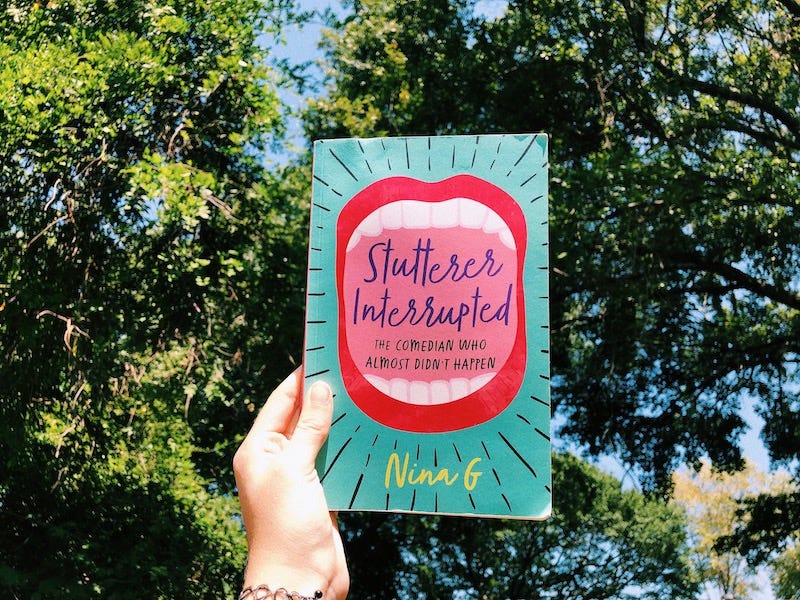
image description: Nina G’s book, Stutterer Interrupted, which features a wide-open illustrated mouth with red lips against a turquoise background. The photo is taken against a background of trees with bits of blue sky.
You need a person like Nina in your life.
Nina and I are actually both from California, but we had to go all the way to Iceland to meet! My mom is a speech-language pathologist and, as a graduation present, invited me to come along with her to Iceland for an international stuttering conference. Even though I’m fluent (meaning I don’t stutter or have any other communicative disorders, save for a minor voice disorder), I’ve tagged along with my mom to a few stuttering conferences and usually opt to explore the surrounding area instead of attending presentations and panels, which are usually research-focused and full of people with PhDs talking about things way above my station. Last year I attended a stuttering conference in Rome, so I had plenty to explore. But the secluded area of this conference, in semi-rural Iceland, meant that unless I wanted to go solo hiking in drizzling weather, it was best for me to stick around and hear some presentations.
Going into this conference, I didn’t even think of it as a disability conference. Maybe because I’m so used to hearing about stuttering from a speech-language pathologist’s perspective, I had honestly mostly neglected the perspectives and lived experiences of people who stutter. At this conference, I met a vast range of people in the stuttering community. There were people from 26 different countries who all had their own experiences to share, and even as a fluent person I could feel what an incredible connection everyone at the conference was fostering.
While Nina’s book is mostly a memoir-in-essays, it really helped me understand how stuttering is incorporated in the Disability community. Nina also has dyslexia and learning disabilities, and shares her experience getting (or not getting) accommodations at a Catholic school in the ‘80s. Other topics include grad school, prom dates, and the weirdness of feeling validated by Howard Stern. She discusses her passion for comedy and all the comedians she looked up to growing up, and transforms the story of her career into an overarching look at being not only a stuttering female comedian, but a member of the Disability community and a person who is constantly learning and growing (as we all are!). Nina is an incredibly important — and funny — voice for people with learning disabilities and people who stutter, and I’m so glad her book is out in the world.
Nina has some comedy and interviews on YouTube! (Pro tip from Nina: Don’t go in the comments section, it’ll turn your brain into a public toilet.)
You can also follow Nina on Twitter.
The Pretty One by Keah Brown
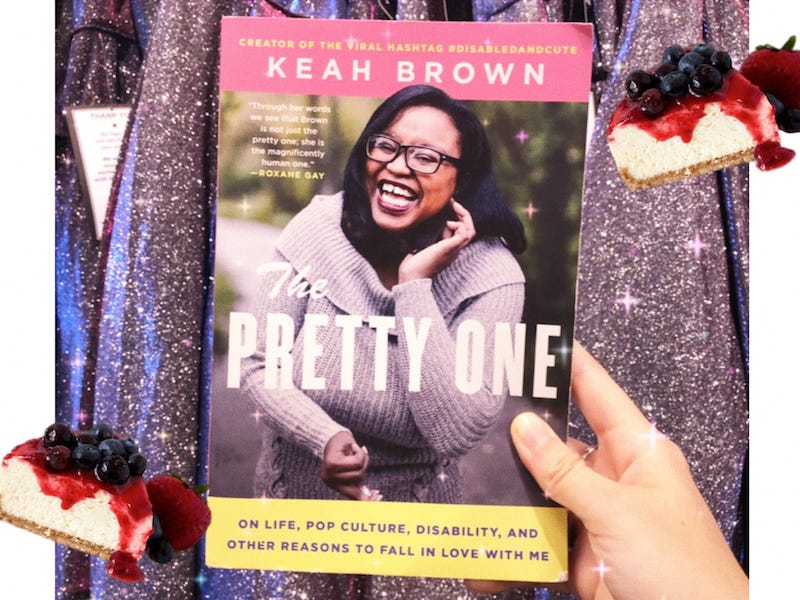
image description: Keah Brown’s book The Pretty One against a background of sparkly fabric. The photo is overlayed with sparkle effects and slices of cheesecake.
I’d looked forward to Keah’s book since I started following her on Twitter sometime within the last year, and her book did not disappoint. Keah’s collection includes first-person essays about her experiences with cerebral palsy, being an identical twin, Black womanhood and Black disabled womanhood, romantic comedies, pop punk, #DisabledandCute (the hashtag she coined), chairs, and so much more. It’s written pretty conversationally, like talking with a friend. I got the print book, but ended up listening to the audiobook more often than physically reading, as I was commuting a lot, so I heard all of the essays in Keah’s own voice — literally. What I found most impressive about Keah’s writing was the way that she was able to incorporate discussions of ableism, oppression, and racism so easily into her work in a way that didn’t feel forced at all. It’s accessible (ha) without being pandering or patronizing and I think that’s really an accomplishment.
One of my favorite essays in the collection is “The Freedom of a Ponytail,” where she discusses how important it was to finally figure out how, as a disabled Black woman, to put her hair in a ponytail. It’s the kind of thing that most people don’t think about at all, and I’m deeply grateful to Keah for writing about it, because I think that’s kind of the gist of living with chronic illness or disability: celebrating accomplishments that seem insignificant to others, and finding ways to celebrate yourself along the way. I also really enjoyed Keah’s writing about Paramore and various films of her adolescence, and I hope she gets the chance to do more culture writing soon.
For as much as Keah writes about designer clothes and cheesecake, she’s not afraid to shy away from the difficult stuff, either. The last chapter of the book was one of the most emotional, where she discusses her history of suicidal ideation in high school and college. This is difficult to write about on its own, but she also discusses the idea that this is how disabled people are supposed to feel — we’re supposed to hate our bodies, yearn for different, more functional bodies, we’re supposed to feel broken. Keah erases these expectations by boldly expressing her love for her body and her life, no matter its differences. It sounds cheesy, but it really helped. I can see this book helping a lot of people, especially young women with chronic illness or disability.
Also: Because Keah writes about fashion and spending time at the mall with her friends as a teenager, I decided to take Keah to the mall. I took the above in front of some really sparkly fabric because idk, it felt like Keah would like it?
You can follow Keah Brown on Twitter.
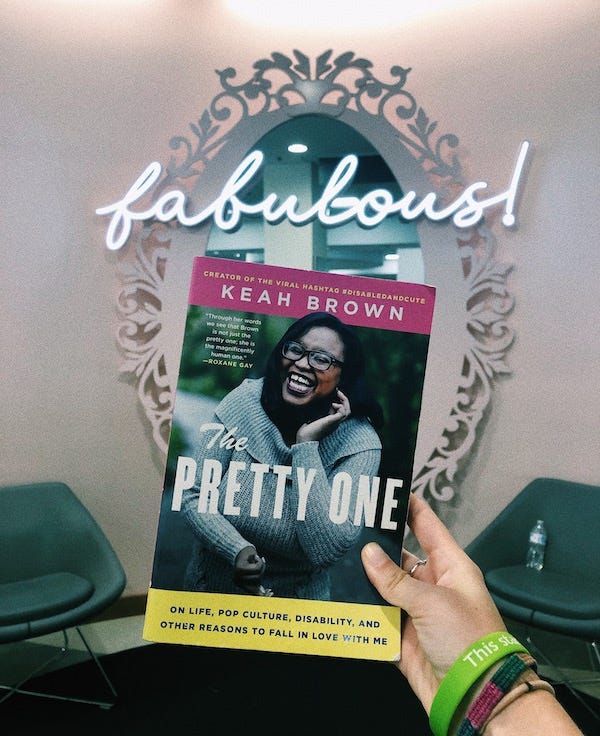
image description: The Pretty One in front of a mall dressing-room mirror emblazoned with the word “fabulous!” in white neon.
and I had my own little #DisabledandCute moment listening to her audiobook on the train.

image description: Alex, a white woman with glasses and chest-length brown hair, also the author of this newsletter, on Atlanta public transportation. She has earbuds in and is listening to Keah’s book. She is #DisabledandCute.
a last note
A while ago my girlfriend Lydia and I were talking about the Mars One mission, that thing where a ship of incredibly healthy and optimally selected people are ostensibly going to go to Mars and never come back. Lydia asked if I’d go into space like when it’s commercialized recreationally and I said I’m too sick to go into space and she offered the hypothesis that if the two of us, herself a resident of the realm of alopecia and myself a thyroidsick girl and both of us women and homosexuals were to go into space together that our autoimmunity and space-travel-barring faults would cancel each other out. That is how math works I’m pretty sure
We’ll see you in the stars, friends
~alex

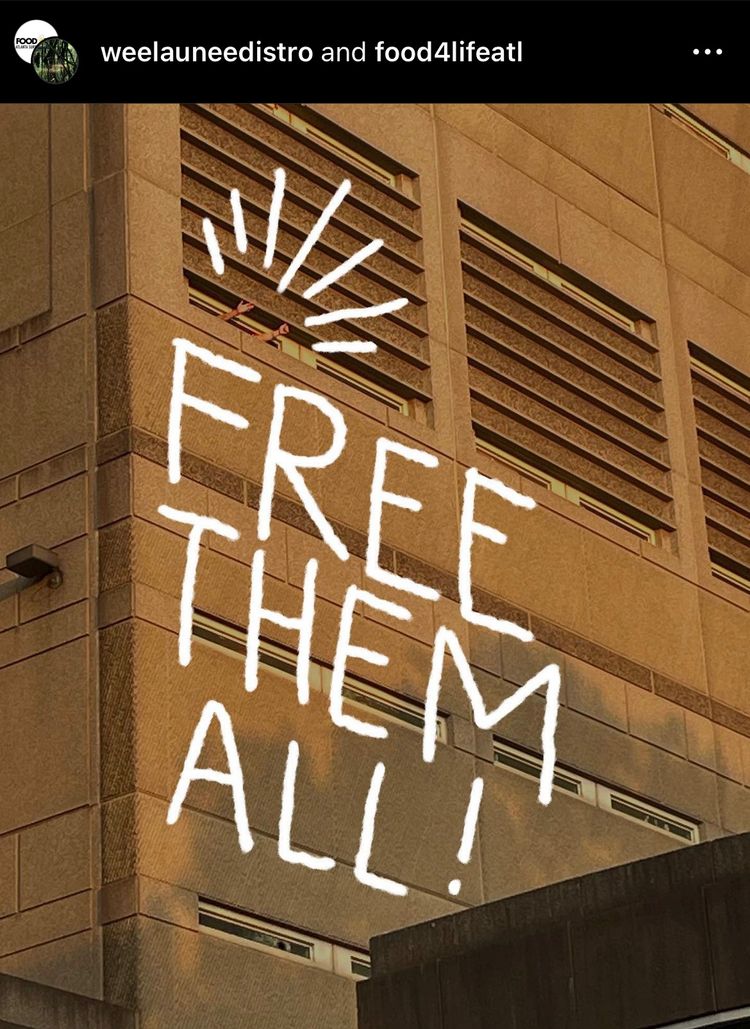
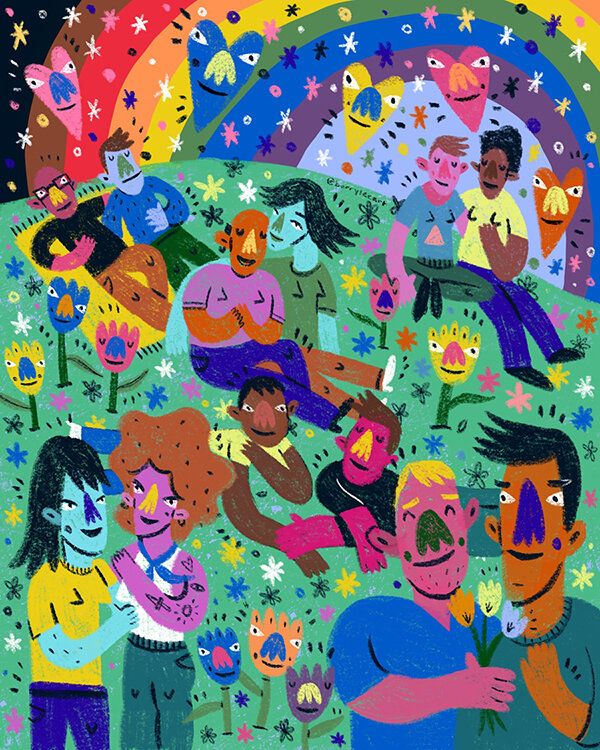

![[substack archives] I'm gonna do my own talking](/content/images/size/w750/2021/05/https___bucketeer-e05bbc84-baa3-437e-9518-adb32be77984.s3.amazonaws.com_public_images_56aefcb7-df39-499b-b650-dd967b07ca4c_640x476.jpeg)
![[substack archives] puresound 001: pride month forever](/content/images/size/w750/2021/05/https___bucketeer-e05bbc84-baa3-437e-9518-adb32be77984.s3.amazonaws.com_public_images_2d371990-9fb9-47b8-8a18-035229ee30d4_1000x667.jpeg)